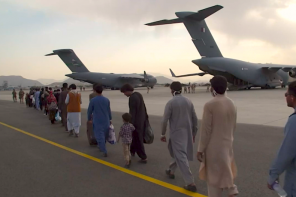Today’s New York Times contains a little sleeper piece that almost escapes notice beneath the bigger headline about vote fraud in Afghanistan. In it Jim Glanz points out that Pentagon-employed contractors not only outnumber uniformed U.S. troops in Afghanistan but also that the ratio of contractors to military personnel there is the highest of any war in U.S. history. In a new study, the Congressional Research Service reports that contractors make up 65% of the Pentagon’s overall forces in Afghanistan over the past two years. And this is just for the Pentagon: the new CRS report does not address contractors working for the State Department or CIA in Afghanistan.
Part of what this means, Glanz notes, is that ordinary Afghans are likely to see a lot of well-paid folks (mainly Yankees but also other Afghans) “wearing the scruffy cargo pants, polo shirts, baseball caps, and other casual accouterments favored by overseas contractors rather than the fatigues and flight suits of the military.” Sounds kind of cool. Except that these casually dressed folks have the power to wield lethal force with almost no accountability. Nothing like dropping in a lot of trigger-happy hired guns to win hearts and minds, right?
The U.S. commander upon whom Obama has placed responsibility for winning what he calls a “war of necessity” in Afghanistan, Gen. Stanley McChrystal, acknowledged recently that we are losing ground there because (surprise) ordinary Afghans appear to resent our casual killing in their country. In view of this you might think Gen. McChrystal would be worried about the impact of so many mercenaries; if he his, he is doing nothing to change it.
But here is the part of Glanz’s piece I particularly like. He quotes Frederick Barton of the Center for Strategic and International Studies, who tracks our country’s growing reliance on civilian mercenaries. Barton observes that “no one really knows whether having a force made up mainly of contractors whose salaries were often triple or quadruple those of a corresponding soldier or Marine was cheaper or more expensive for the American taxpayer.”
Excuse me? “No one really knows”??
I’m not an economist, but even I know: it’s clearly more expensive in the direct cost-per-individual sense, and it is vastly more expensive in terms of the cost to the way our massive and growing presence in that very poor country is perceived by the locals.
I’m not the first to suggest that Afghanistan will be Obama’s Vietnam. Trying to run the operation with unaccountable hired help is just one reason this venture has Big Doom written all over it.
A week ago the Times listed five books that the President plans to read in Martha’s Vineyard. Too bad Barbara Tuchman’s The March of Folly isn’t one of them.




